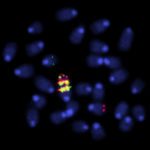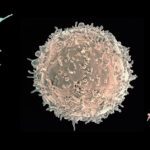Présentation
Chromosomal translocations can promote cancer development by disrupting tumor suppressors, activating oncogenes, or generating aberrant fusion proteins. Fusion genes are frequent in cancers and are used as diagnostic and prognostic tools to classify and treat patients. Yet, despite the wide range of recurrent chromosomal translocations identified in various cancers over the past decades, the origin of translocations and the path from their formation to tumor onset is still obscure. Translocations are generally seen as the misrepair of DNA double-strand breaks (DSBs) and the inappropriate joining of the wrong pair of DNA ends. Therefore, identifying and understanding the source of DNA lesions and the mechanisms leading to translocation formation is a major challenge for the coming years.
Specific aim of the project: To identify regulators of chromosomal translocation formation.
Where do translocation hotspots come from? What are the regulators (suppressors and promoters) of translocation formation? We will address these questions in the context of DNA break formation by two nucleases – RAG1/2 cuts at physiological Immunoglobulin gene segments and CRISPR/Cas9 cuts at sites prone to translocations in human leukemia –, DNA repair pathway choice , cell cycle stage and replicative stress.



